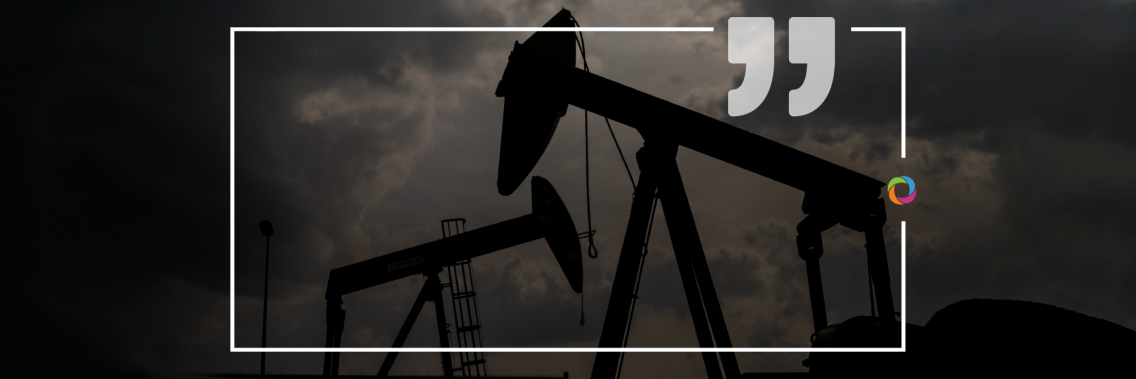When countries first went into lockdown to try to stem the pandemic, air travel was halted, stores and restaurants closed and people stopped driving to work and stayed at home instead. In August, Exxon Mobil, once the largest publicly traded company in the world, was dropped from the Dow Jones industrial average after 92 years. What are the impacts of COVID-19 on the oil and gas industries and how will this affect developing countries? Read some opinions below.
What are the impacts of COVID-19 on the oil and gas industries?

“COVID-19 affected the industry across the entire value chain and from upstream to downstream with varying levels of severity. Downstream, the effects were relatively short term, easing with the lifting of lockdown. Upstream and midstream, the effects may linger on until investors stabilize their cash flows. Companies and countries that are still in exploration and development alone may see little progress towards production as crude prices have remained too low to encourage investment in new production projects.”

“Oil and gas industries tend to go through ups and downs on a regular basis, the last time being in 2014-15. Every crash has been followed by an eventual recovery but the recent crash in oil prices initiated by low demand (because of COVID-19) is completely different and is likely to be a permanent one. On earlier occasions, there were the usual lay-offs and cost-cutting with ongoing projects frozen or delayed. This time around, we still see the lay-offs and cost-cutting exercises but what’s totally different is the big operators hiving off assets, committing to lower their ‘oil and gas’ investment in the long run and simultaneously diversifying into ‘renewable energy’, a curtain raiser to the future of the oil industry. While experts have been worrying about ‘peak oil’ for decades now, I think it’s already here because of less demand rather than availability which is what was originally speculated. Oil and gas were supposed to be phased away gradually to reduce GHG emissions but COVID-19 is going to hasten the process.”

“The oil and gas industry in general is cyclical in nature and driven by the elastic characteristic of demand and supply which, in turn, is influenced by economic psychology and behavior. COVID-19, while being unpredictable, still falls into the same category of behavioral economy. The largest impact has and will continue to be on the global supply chain.”

“Offices shut down but operations have generally kept going. Oil production and refining are not labor-intensive processes. Huge super-tankers sail with only a couple of dozen crew and retail sales have become largely self-service.”

“The COVID-19 pandemic has caused wide ranging impacts on the oil and gas industry. We briefly highlight some of these. The industry has seen a significant fall in oil and gas demand due to the contraction of global economic growth coupled with a steep decline in oil and gas prices. The low-price environment has constrained the industry’s cash flows with consequential cuts in capital expenditure and jobs, and shutdowns in production. The industry has suffered increased logistic challenges to sustain industry operations due to the COVID-19 lockdowns and social distancing rules.”
How will this affect developing countries?

“O&G is one of the key resources that holds growth potential for many countries in the developing world. A slow O&G industry worldwide means dismal investment in those countries, affecting local businesses, associated jobs and investment in social projects. Delayed gas to power projects for example in Tanzania and Mozambique may keep Africa’s reliance on fuel wood for longer thereby worsening climate change effects.”

“The low cost will definitely have a positive effect on the economies of developing countries which still rely on oil and gas as a primary source of energy, by reducing their forex expenditure. On the other hand, it will have a negative impact on economies, especially the underdeveloped and developing ones with a high dependence on the industry and no other major source of revenue. It could also lead to political turmoil, conflict and affect international relations.”

“For the oil-exporting developing countries, particularly those with a fragile oil-exporting economy, they will, for the next decade, face difficult decisions to re-structure their economies. Decision-making will be exacerbated by the accelerated emergence and institutionalization of transitioning from fossil fuels (hydrocarbon molecules) to renewables and low-carbon (electrons) electricity.”

“The confluence of persistent low prices (Brent crude is trading at $43/barrel) and the demand slump induced by COVID-19 is crushing producers. Oil-producing developing countries like Mozambique, Venezuela, Brazil, Mexico, Nigeria, etc. that rely on the revenue are suffering unprecedented revenue shortfalls. On the flip side, the extraordinary slump in demand may motivate these producers to transition to renewables, and non-oil producing developing countries (e.g., Ethiopia, Kenya, Laos, Peru, etc.) can benefit from lower energy prices.”

“The declining oil and gas prices will strain public finances for oil and gas exporters but, for importers, it will mean a reduced import bill, allowing the savings to help build fiscal space. Attracting risk capital to develop oil and gas resources will be more challenging, but there is opportunity to implement structural reforms to eliminate fuel subsidies and introduce energy taxes.”
Will this impact also affect international relations and, if so, why?

“Yes, certainly. A number of developing countries are relying on their potential for oil and gas to harness their bargaining power in fostering gainful relationships with energy-hungry industrial nations and for other strategic reasons. With dwindling optimism in oil and gas, there will be a shifting focus from relations built solely on oil and gas to perhaps renewable energy resources.”

“The transition to renewables and low-carbon energy is the catalyst for developing a shared understanding of the global energy economy and as such the interconnected global socio-political and geopolitical dynamic. Under this scenario, oil-exporting countries, particularly in the MENA region, will have to diversify their economies which will lead to a more socio-political stability.”

“So, while poor countries have been terribly and disproportionally hurt from a humanitarian perspective and from an oil perspective, 2020 has induced a leveling effect: oil-rich countries are running budget deficits while poor countries are able to benefit from lower energy prices. COVID-19 can take partial credit for that.”
Check out more than 30 job opportunities related to the oil industry sector here.

